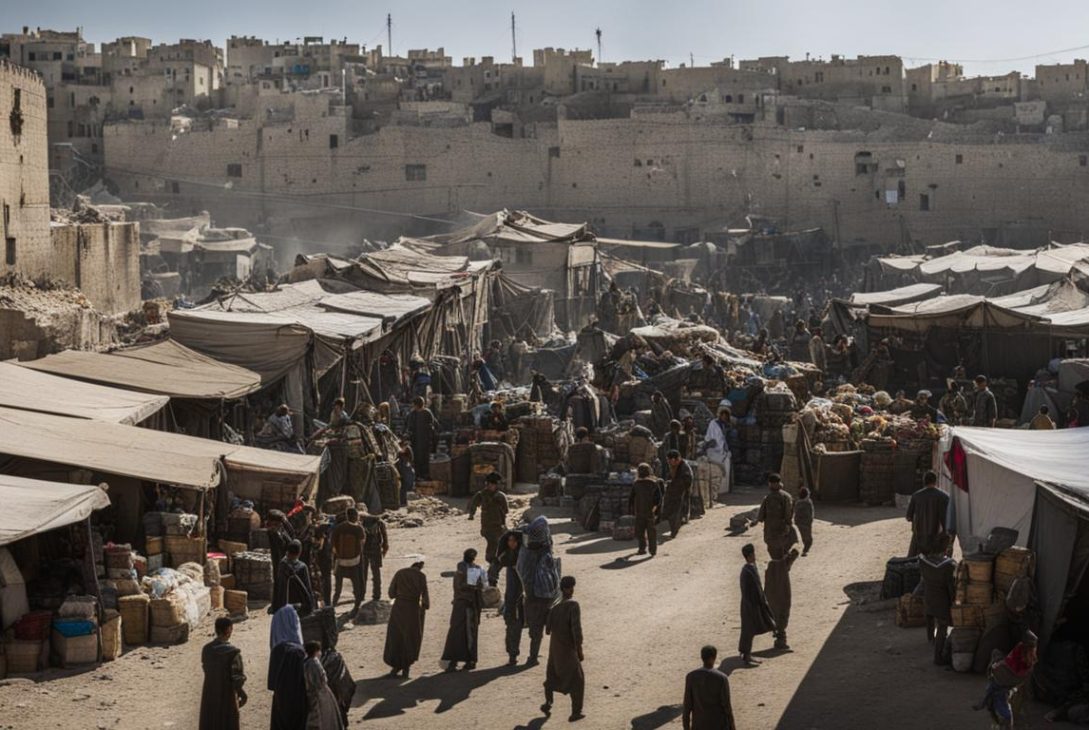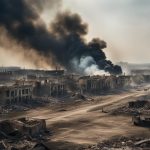The Israeli-Palestinian conflict has been a long-standing issue in the Middle East, with both sides experiencing significant losses and ongoing tensions. The conflict centers around the disputed territories of the Gaza Strip and the West Bank, where Palestinians seek statehood and independence, while Israel maintains control due to security concerns. This complex and multifaceted conflict has garnered attention and concern from the international community, leading to numerous peace negotiations and United Nations resolutions.
Despite various attempts at finding a resolution, the conflict persists, and understanding its intricacies is crucial for fostering a balanced perspective. The Israeli occupation of Palestinian territories, the push for a two-state solution, and the ongoing peace negotiations are all important aspects to consider. It is essential to delve deeper into the history, political dynamics, and humanitarian implications to grasp the complexities of this conflict.
Key Takeaways:
- The Israeli-Palestinian conflict is a longstanding issue in the Middle East with significant consequences for both parties involved.
- The conflict revolves around the disputed territories of the Gaza Strip and the West Bank.
- Understanding the history, political dynamics, and humanitarian implications is crucial for developing a balanced perspective on the conflict.
- The Israeli occupation, the push for a two-state solution, and ongoing peace negotiations are key elements to consider.
- Efforts from the international community, including United Nations resolutions, have been made to address the conflict.
Israel’s Right to Defend Itself is a Fundamental Imperative
Israel’s right to self-defense is a fundamental imperative recognized by the international community. In the face of significant security threats posed by terrorist organizations like Hamas and Hezbollah, Israel must take measures to protect its citizens and maintain stability in the region. While critics often accuse Israel of using disproportionate force, it is important to recognize the complexities and challenges involved in combating terrorism while minimizing civilian casualties.
“We have a right to defend ourselves. We have a right to live in peace and security.”
Israel’s security measures, such as blockades and the security barrier in the West Bank, are implemented to prevent violence and safeguard the lives of Israeli civilians. These measures are lawful under international law, as a nation has the inherent right to protect itself from acts of terrorism and aggression. However, Israel strives to strike a balance between security needs and minimizing harm to civilians.
Hezbollah and Hamas: Threats to Israeli Security
Hezbollah and Hamas are two significant threats to Israeli security, with both organizations aiming to undermine peace and stability in the region. Hezbollah, based in Lebanon, is a Shiite militant group that has launched attacks against Israel and is deeply involved in regional conflicts. Hamas, on the other hand, is a Palestinian Islamist organization that controls the Gaza Strip and frequently launches rocket attacks on Israeli territory.
Both Hezbollah and Hamas deliberately operate from civilian areas, using innocent people as human shields and intentionally placing them at risk. This tactic poses immense challenges for Israel in its efforts to combat terrorism while adhering to international law and minimizing civilian casualties. Israel faces the difficult task of differentiating between legitimate military targets and innocent civilians in urban warfare scenarios.
| Organization | Activities |
|---|---|
| Hezbollah | – Launches attacks against Israel – Involved in regional conflicts |
| Hamas | – Controls Gaza Strip – Launches rocket attacks on Israel |
Challenging Israel’s Actions and A Call for a More Balanced Approach
Critics argue that Israel’s actions in the Israeli-Palestinian conflict often involve the disproportionate use of force and result in human rights abuses. These actions have been a subject of international concern and debate. While Israel justifies its measures as necessary for self-defense and security, opponents believe that they go beyond what is acceptable under international law.
The issue of settlements in the West Bank is particularly contentious. The United Nations considers these settlements illegal and an obstacle to peace. Israel’s continued expansion of settlements has garnered widespread criticism as it undermines the possibility of a viable Palestinian state. The establishment of settlements violates United Nations resolutions and further complicates the conflict.
“The international community must hold Israel accountable for its actions. The use of disproportionate force and the continuation of settlements impede progress towards a peaceful resolution. It is crucial to adopt a more balanced approach that upholds the principles of international law and respects the rights and dignity of all parties involved.”
The Impact of United Nations Resolutions
United Nations resolutions play a significant role in shaping international opinion and efforts to address the Israeli-Palestinian conflict. These resolutions condemn Israel’s actions, particularly with regards to settlements, and call for a return to negotiations towards a two-state solution. However, implementing these resolutions has proven challenging, and there is a lack of consensus among member states on how to enforce them effectively.
Moreover, while some resolutions hold Israel accountable for its actions, they often face resistance from countries that support Israel. This politicization further hinders progress towards a balanced approach and long-term resolution of the conflict. It is important for the international community to work together to ensure the implementation of United Nations resolutions and hold all parties accountable for their actions.
| United Nations Resolutions | Description |
|---|---|
| Resolution 242 | Called for Israeli withdrawal from territories occupied during the 1967 Six-Day War and the recognition of Israel’s right to exist within secure boundaries. |
| Resolution 338 | Called for a ceasefire and renewed negotiations to implement Resolution 242. |
| Resolution 478 | Condemned Israel’s annexation of East Jerusalem and called on member states to withdraw their diplomatic missions from the city. |
| Resolution 2334 | Condemned Israeli settlements as a violation of international law and called for their immediate cessation. |
These resolutions highlight the international community’s recognition of the need for a more balanced approach to the Israeli-Palestinian conflict. By upholding the principles of international law and implementing these resolutions, there is hope for progress towards a just and sustainable resolution.
Reaffirming Israel’s Right to Self-Defense in a Complex Conflict
In the midst of the Israeli-Palestinian conflict, Israel faces significant security threats that necessitate self-defense measures. These threats often arise from urban warfare situations, where militant groups operate within densely populated areas, making it challenging to prevent civilian casualties.
Adhering to international law, Israel aims to minimize civilian harm while protecting its citizens. However, the complex nature of the conflict presents difficulties in achieving this goal. The use of force in densely populated areas poses the risk of unintentional civilian casualties. Urban warfare compounds these challenges, as militants intentionally embed themselves in civilian infrastructure, using it as a shield.
To address these security threats, Israel employs a range of measures to safeguard its citizens. These include targeted operations against militant leaders, intelligence gathering, and the implementation of security barriers to prevent unauthorized access. Despite these efforts, the nature of urban warfare and the ongoing conflict make it challenging to entirely eliminate the risk of civilian casualties.
“We must recognize that Israel, like any sovereign nation, has the right to self-defense. And in a complex conflict like this, where security threats are ever-present, striking the delicate balance between ensuring the safety of Israeli citizens and minimizing civilian harm is a formidable task.”
| Year | Security Threats | Civilian Casualties | International Law |
|---|---|---|---|
| 2008-2009 | Operation Cast Lead, targeted Hamas militants in the Gaza Strip | Over 1,400 Palestinians and 13 Israelis killed | Israel’s actions examined by the United Nations |
| 2014 | Operation Protective Edge, response to increased rocket attacks from Gaza | 2,139 Palestinians and 73 Israelis killed | International investigations into alleged war crimes |
| 2021 | Military operations against rocket attacks from Hamas in Gaza | 254 Palestinians and 12 Israelis killed (as of May) | Ongoing calls for investigations into possible violations of international law |
Prominent Books for Understanding the Palestinian Conflict
For those seeking a deeper understanding of the Israeli-Palestinian conflict, there are several important books that offer valuable insights from different perspectives. These books delve into the historical context, indigenous coexistence, the influence of the Holocaust on the conflict, and the ongoing struggle for Palestinian rights. By exploring these diverse narratives, readers can gain a more comprehensive understanding of the complex dynamics at play.
Apeirogon
Apeirogon by Colum McCann is a novel that navigates the complexities of the conflict through the story of two fathers, one Israeli and one Palestinian, who both lost their daughters to the violence. Through their friendship and shared experiences, the book explores themes of grief, loss, and the power of empathy in the pursuit of peace.
The Age of Coexistence
The Age of Coexistence by Ussama Makdisi examines the history of Palestine before the creation of Israel, highlighting periods of peaceful coexistence between Jews, Muslims, and Christians. This book challenges the notion that the conflict is rooted in ancient enmity and provides a nuanced perspective on the potential for peaceful coexistence.
Rethinking the Holocaust
Rethinking the Holocaust by Yehuda Bauer explores the impact of the Holocaust on the Israeli-Palestinian conflict. Bauer argues that the Holocaust should not be used to justify the oppression of Palestinians but rather should serve as a reminder of the importance of empathy, justice, and human rights for all people.
The Hundred Years’ War on Palestine
The Hundred Years’ War on Palestine by Rashid Khalidi offers a comprehensive historical analysis of the conflict, examining the role of imperial powers, the Zionist movement, and Palestinian resistance. By tracing the roots of the conflict over the past century, Khalidi provides a unique perspective on its complexities.
The Crisis of Zionism
The Crisis of Zionism by Peter Beinart explores the evolving nature of Zionism and the challenges it faces in the context of the Israeli-Palestinian conflict. Beinart argues for a more inclusive and democratic vision of Zionism that prioritizes equality and justice for all people living in the region.
The Israeli-Palestinian Conflict: What Everyone Needs to Know
The Israeli-Palestinian Conflict: What Everyone Needs to Know by James L. Gelvin provides a comprehensive overview of the conflict, covering its historical background, key players, and current challenges. This book serves as an essential primer for those seeking a balanced understanding of the conflict.
The Arabs
The Arabs by Eugene Rogan provides a comprehensive history of the Arab world, including the impact of colonialism and the Israeli-Palestinian conflict. By exploring the broader regional context, Rogan sheds light on the intertwined histories and aspirations of the Arab people.
The Ethnic Cleansing of Palestine
The Ethnic Cleansing of Palestine by Ilan Pappé examines the forced displacement of Palestinians during the creation of Israel in 1948. Pappé challenges prevailing narratives and offers a critical analysis of the events that led to the establishment of the state of Israel.
By engaging with these important works, readers can gain a more nuanced understanding of the Israeli-Palestinian conflict, its historical roots, and the ongoing struggles for justice and peace.
| Book Title | Author | Description |
|---|---|---|
| Apeirogon | Colum McCann | A novel that explores the complexities of the conflict through the lives of two fathers who have lost their daughters. |
| The Age of Coexistence | Ussama Makdisi | An examination of peaceful coexistence between Jews, Muslims, and Christians in pre-Israel Palestine. |
| Rethinking the Holocaust | Yehuda Bauer | An exploration of the Holocaust’s impact on the Israeli-Palestinian conflict, emphasizing the importance of empathy and human rights. |
| The Hundred Years’ War on Palestine | Rashid Khalidi | A historical analysis of the conflict, tracing its roots and examining the role of various actors. |
| The Crisis of Zionism | Peter Beinart | A critique of Zionism and a call for a more inclusive and democratic approach to the conflict. |
| The Israeli-Palestinian Conflict: What Everyone Needs to Know | James L. Gelvin | An introductory guide to the conflict, covering its history, key players, and current challenges. |
| The Arabs | Eugene Rogan | A comprehensive history of the Arab world, including the Israeli-Palestinian conflict. |
| The Ethnic Cleansing of Palestine | Ilan Pappé | A critical analysis of the forced displacement of Palestinians during the establishment of Israel. |
A Systems Thinking Approach to the Israeli-Palestinian Conflict
Understanding the Israeli-Palestinian conflict requires a comprehensive and nuanced perspective. Adopting a systems thinking approach allows for a deeper exploration of the chronic problems, interdependencies, and cycles of violence that perpetuate the conflict. By examining the conflict from a systems view, sustainable solutions may be identified to pave the way for lasting peace.
Systems thinking acknowledges the complex web of relationships, feedback loops, and unintended consequences that shape the Israeli-Palestinian conflict. It recognizes that isolated actions or short-term solutions may only offer temporary relief and fail to address the underlying causes. Instead, a holistic understanding of the conflict is necessary to break the cycle of violence and reach a sustainable resolution.
“A systems-thinking approach reveals how the Israeli-Palestinian conflict is not simply a clash between two parties, but a deeply entwined and interconnected issue with historical, political, and socio-economic dimensions.”
By unraveling the interconnectedness of various components, such as political structures, economic disparities, and social dynamics, a systems thinking approach offers insights into the root causes of the conflict. It highlights the need to address not only immediate tensions but also the underlying systemic factors that contribute to ongoing violence and instability.
Ultimately, a systems thinking approach challenges traditional notions of conflict resolution and opens up new possibilities for sustainable peace. By considering the broader context and addressing the interdependencies within the Israeli-Palestinian conflict, stakeholders can work towards long-term solutions that prioritize mutual understanding, respect, and coexistence.

The Four-Stage Cycle of the Israeli-Palestinian Conflict
The Israeli-Palestinian conflict follows a recurring four-stage cycle that perpetuates the ongoing tensions and hinders long-term resolutions. Understanding this cycle is crucial in order to break the cycle and achieve sustainable peace in the region.
Fight for Existence
The cycle begins with both sides, Israel and Palestine, fighting for their right to exist. This stage represents the deep-rooted historical and ideological claims that shape the conflict. Israel argues for its right to a secure homeland, while Palestinians seek self-determination and statehood. The fight for existence creates a fundamental barrier to finding common ground and initiating peaceful negotiations.
Tension Escalation
As the fight for existence persists, tensions escalate between the two sides. Historical grievances, territorial disputes, and acts of violence fuel animosity and deepen the divide. This stage often involves acts of terrorism, military operations, and retaliatory attacks, leading to a deteriorating security situation and further entrenchment of opposing positions. The escalation of tension heightens the complexity of the conflict and makes finding a peaceful resolution more challenging.
Negotiations
Despite the ongoing tensions, pressures from the international community and regional actors often push both sides to engage in negotiations. This stage represents a glimmer of hope for a potential resolution. Negotiations aim to address the core issues, such as borders, settlements, refugees, and the status of Jerusalem. However, previous peace efforts have been marred by trust issues, disagreements, and the inability to reach mutually acceptable compromises.
Peace Efforts Break Down
Unfortunately, the cycle often ends with the breakdown of peace efforts. Factors such as a lack of trust, unmet expectations, political shifts, and extremist influences contribute to the failure of negotiations. The failure to sustain peace efforts perpetuates the cycle, leading to a return to the previous stages of fighting for existence and escalating tensions.
In summary, the Israeli-Palestinian conflict is characterized by a recurring four-stage cycle: the fight for existence, tension escalation, negotiations, and the subsequent breakdown of peace efforts. Breaking this cycle requires a comprehensive and balanced approach that addresses historical grievances, security concerns, and the aspirations of both Israelis and Palestinians. Only through sustained dialogue, cooperation, and empathy can a lasting resolution be achieved.
The Persistent Challenges and Desired Solutions in the Israeli-Palestinian Conflict
In the Israeli-Palestinian conflict, there are persistent challenges that hinder progress towards peaceful coexistence and viable solutions. These challenges revolve around issues of security, sovereignty, and mutual respect. The desire for control of all the land and the perceived threat to each party’s existence contribute to the ongoing conflict. However, there are voices on both sides seeking negotiation and compromise, paving the way for a sustainable resolution.
Security is a paramount concern for both Israel and Palestine. The history of violence and the presence of extremist elements pose significant threats to the safety of their respective populations. The need for robust security measures cannot be overstated, but striking a balance between security and the preservation of human rights is crucial. Any viable solution must address these security concerns while upholding international standards of justice and respect for human life.
Sovereignty is another key issue in the Israeli-Palestinian conflict. Both Israelis and Palestinians aspire to self-governance and the recognition of their national identities. However, conflicting claims to land and resources have created deep divisions. A resolution must satisfy the aspirations of both parties, ensuring that they can coexist as sovereign entities within secure and internationally recognized borders.
| Challenges | Desired Solutions |
|---|---|
| Security concerns and threats to human life | Negotiations that prioritize the protection of civilian populations and uphold international law |
| Conflicting claims to land and resources | A mutually agreed-upon border and land-sharing arrangement that respects the national aspirations of both Israelis and Palestinians |
| Mutual distrust and lack of respect | Dialogue and reconciliation initiatives that foster understanding, empathy, and mutual respect |
| Economic disparities and barriers to development | International support for economic development projects that benefit both Israelis and Palestinians, promoting stability and cooperation |
Ultimately, resolving the Israeli-Palestinian conflict requires genuine negotiation, empathy, and a commitment to finding common ground. It is imperative for the international community to support these efforts by facilitating dialogue, promoting understanding, and respecting the self-determination of both Israelis and Palestinians. Only through a collective commitment to peace can the persistent challenges be addressed, and desired solutions be realized.
Conclusion
The Israeli-Palestinian conflict is a complex and deeply-rooted issue that has spanned many decades. The key to finding a sustainable solution lies in achieving a comprehensive understanding of the conflict and embracing a balanced perspective.
By delving into the perspectives of both Israelis and Palestinians, it becomes clear that there are valid concerns and rights on both sides. Acknowledging these challenges and grievances is essential for fostering a meaningful dialogue and finding common ground.
Embracing sustainable solutions requires a commitment to negotiation, respect, and compromise. It is only through open and inclusive discussions that a path towards peaceful coexistence can be forged. The search for a resolution should focus on addressing the root causes of the conflict, while considering the security and sovereignty needs of both parties.
Ultimately, achieving a lasting peace in the Israeli-Palestinian conflict is a shared responsibility. It requires a collective effort from the international community, as well as the commitment of Israelis and Palestinians themselves. By working towards mutual understanding, embracing a balanced perspective, and exploring sustainable solutions, there is hope that a just and lasting resolution can be achieved.
FAQ
What is the Israeli-Palestinian conflict?
The Israeli-Palestinian conflict refers to the ongoing dispute between Israel and Palestine over land, resources, and political sovereignty.
How long has the conflict been going on?
The conflict has been ongoing for several decades, with tensions dating back to the early 20th century.
What is Israel’s right to self-defense?
Israel, like any other sovereign nation, has the right to protect its citizens from security threats and defend itself against acts of terrorism.
Are Israel’s security measures justified?
Israel implements security measures such as blockades and the security barrier in the West Bank to minimize violence and protect its citizens from security threats.
Does Israel use disproportionate force?
Critics argue that Israel often uses disproportionate force, leading to civilian casualties and human rights abuses. However, Israel aims to minimize civilian casualties and protect its citizens while facing significant security threats.
Are settlements in the West Bank legal?
The United Nations considers Israeli settlements in the West Bank to be illegal and views them as obstacles to peace.
What books provide insight into the Israeli-Palestinian conflict?
Some valuable books for understanding the Israeli-Palestinian conflict include “Apeirogon,” “The Age of Coexistence,” “Rethinking the Holocaust,” “The Hundred Years’ War on Palestine,” “The Crisis of Zionism,” “The Israeli-Palestinian Conflict: What Everyone Needs to Know,” “The Arabs,” and “The Ethnic Cleansing of Palestine.”
How can a systems thinking approach help understand the conflict?
A systems thinking approach focuses on the interdependencies and feedback loops that contribute to the conflict, aiming to identify leverage points and create sustainable solutions.
What is the four-stage cycle of the conflict?
The conflict follows a pattern of four stages: fighting for the right to exist, escalating tension, attempts at negotiations, and eventual breakdown of peace efforts.
What are the persistent challenges in the Israeli-Palestinian conflict?
The conflict faces challenges related to security, sovereignty, and recognition. Desired solutions include peaceful coexistence through viable negotiations and mutual respect.
Source Links
- https://www.unsw.edu.au/news/2023/11/10-books-to-help-you-understand-israel-and-palestine–recommende
- https://dividedwefall.org/israeli-palestinian-conflict/
- https://thesystemsthinker.com/a-systemic-view-of-the-israeli-palestinian-conflict/
Challenging Israel's Actions and A Call for a More Balanced Approach Reaffirming Israel's Right to Self-Defense in a Complex Conflict The Impact of United Nations Resolutions Understanding the Palestinian Conflict: A Balanced Perspective
Last modified: January 17, 2024





